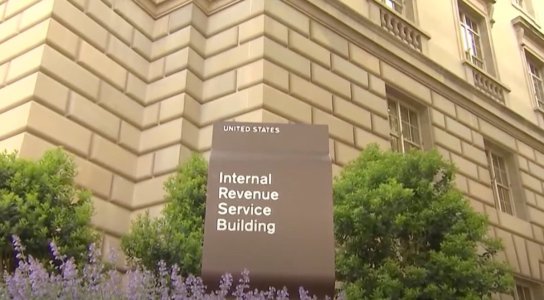Are you eligible for a $1,400 stimulus? Find out if the IRS excluded you!
By
Veronica E.
- Replies 0
In the aftermath of the COVID-19 pandemic, the US government took unprecedented action to help Americans weather the financial storm.
One of the most notable relief measures was the $1,400 stimulus payment, introduced under the American Rescue Plan Act of 2021.
For many, this financial lifeline provided much-needed assistance during uncertain times. However, not everyone is eligible to receive these funds.
We at The GrayVine want to ensure that you're informed and know whether you may be excluded from this relief.
With various criteria in place, it's essential to understand the details so you don’t miss out. Stay informed and take action to secure the financial assistance you're entitled to.

Who's missing out on the $1,400 stimulus payment?
The IRS set clear criteria for the $1,400 stimulus payment, but unfortunately, not everyone fits the bill. Below are the groups who will not receive this payment and the reasons why:
1. No Social Security Number, No Stimulus
A valid Social Security Number (SSN) is required to receive the stimulus payment. If you don't have an SSN or if it's not valid for employment, you will unfortunately be excluded from this round of relief.
This ensures that only eligible taxpayers can benefit from this assistance.
2. Non-Resident Aliens Need Not Apply
For tax purposes, "alien" refers to anyone who is not a US citizen. Non-resident aliens—those without a Green Card or who don't meet the substantial presence test (a measure based on the number of days you've been in the US)—will not qualify for the stimulus payment.
The payment is designed for those who are considered residents for tax purposes.
3. High Earners: The Income Ceiling
The IRS has set income limits to determine eligibility for the full stimulus payment, a reduced amount, or none at all. Here's a quick breakdown:

4. One-Time Deal for Previous Recipients
If you received the full amount of the Recovery Rebate Credit in previous rounds, you won’t get another $1,400.
These stimulus payments were designed as one-time boosts to assist during the pandemic, not recurring benefits.
Navigating Your Eligibility
Before making plans for that $1,400, it’s important to double-check your eligibility. The IRS provides detailed information on their website, but it can be overwhelming to navigate. It’s always a good idea to consult with a tax advisor who can help you clarify your status.
If you’re eligible but haven’t yet received your payment, there may still be an opportunity to claim it through the Recovery Rebate Credit Worksheet when filing your taxes.
For many, the stimulus payment isn't just extra cash—it's a financial lifeline. Missing out on this payment could affect one's ability to meet essential expenses or pay bills. It's a reminder of how crucial it is to stay informed about government programs and to understand how they apply to each individual situation.

Has the stimulus exclusion criteria affected you or someone you know? How have you been impacted? If you have any tips for navigating the world of tax credits and government benefits, we would love to hear from you. Please share your experiences and insights in the comments below!
Also read:
You might be eligible for a new stimulus check from the IRS–Find out how much
Could you get a $7,800 IRS refund? See if you qualify!
One of the most notable relief measures was the $1,400 stimulus payment, introduced under the American Rescue Plan Act of 2021.
For many, this financial lifeline provided much-needed assistance during uncertain times. However, not everyone is eligible to receive these funds.
We at The GrayVine want to ensure that you're informed and know whether you may be excluded from this relief.
With various criteria in place, it's essential to understand the details so you don’t miss out. Stay informed and take action to secure the financial assistance you're entitled to.

Understanding eligibility for the $1,400 stimulus payment is crucial for ensuring you're not missing out on important financial relief. Image Source: Pexels / Photo By: Kaboompics.com.
Who's missing out on the $1,400 stimulus payment?
The IRS set clear criteria for the $1,400 stimulus payment, but unfortunately, not everyone fits the bill. Below are the groups who will not receive this payment and the reasons why:
1. No Social Security Number, No Stimulus
A valid Social Security Number (SSN) is required to receive the stimulus payment. If you don't have an SSN or if it's not valid for employment, you will unfortunately be excluded from this round of relief.
This ensures that only eligible taxpayers can benefit from this assistance.
2. Non-Resident Aliens Need Not Apply
For tax purposes, "alien" refers to anyone who is not a US citizen. Non-resident aliens—those without a Green Card or who don't meet the substantial presence test (a measure based on the number of days you've been in the US)—will not qualify for the stimulus payment.
The payment is designed for those who are considered residents for tax purposes.
3. High Earners: The Income Ceiling
The IRS has set income limits to determine eligibility for the full stimulus payment, a reduced amount, or none at all. Here's a quick breakdown:
- Single filers with an adjusted gross income (AGI) above $75,000.
- Married couples filing jointly with AGIs above $150,000.
- Heads of households with AGIs over $112,500.

IRS headquarters: Ensuring eligibility for stimulus payments and economic relief programs. Image Source: YouTube / 9NEWS.
4. One-Time Deal for Previous Recipients
If you received the full amount of the Recovery Rebate Credit in previous rounds, you won’t get another $1,400.
These stimulus payments were designed as one-time boosts to assist during the pandemic, not recurring benefits.
Navigating Your Eligibility
Before making plans for that $1,400, it’s important to double-check your eligibility. The IRS provides detailed information on their website, but it can be overwhelming to navigate. It’s always a good idea to consult with a tax advisor who can help you clarify your status.
If you’re eligible but haven’t yet received your payment, there may still be an opportunity to claim it through the Recovery Rebate Credit Worksheet when filing your taxes.
For many, the stimulus payment isn't just extra cash—it's a financial lifeline. Missing out on this payment could affect one's ability to meet essential expenses or pay bills. It's a reminder of how crucial it is to stay informed about government programs and to understand how they apply to each individual situation.
Key Takeaways
- Certain Americans will not be eligible for the $1,400 stimulus payment due to specific IRS requirements.
- Individuals without a Social Security Number or non-resident aliens do not qualify for the economic stimulus.
- There are income thresholds that may reduce or eliminate the payment for higher earners.
- Those who have already received the full Recovery Rebate Credit in previous rounds cannot receive additional payments.
Has the stimulus exclusion criteria affected you or someone you know? How have you been impacted? If you have any tips for navigating the world of tax credits and government benefits, we would love to hear from you. Please share your experiences and insights in the comments below!
Also read:
You might be eligible for a new stimulus check from the IRS–Find out how much
Could you get a $7,800 IRS refund? See if you qualify!






